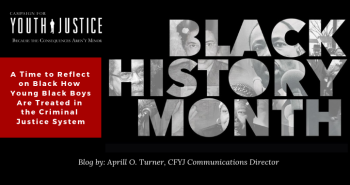Black History Month: A Time to Reflect on Black How Young Black Boys Are Treated in the Criminal Justice System

As January ends and we head into February, it’s time to celebrate Black History Month. Black History Month is a time to celebrate and remember all the ways that African Americans have contributed to our history and culture. It is also a time to reflect on the ills that still plague as a nation. How young Black boys are treated in the criminal justice system is one of those areas. This Black History Month and all year long, the Campaign for Youth Justice is standing up and speaking out about racial bias and inequality in our criminal justice system. At least two of the final four states that have yet to “Raise the Age” will be pushing to do so this year.
We are committed to addressing the structural racism upon which the criminal justice system is built and the racial disparity with which it continues to operate.
During this month of reflection, we remember Kalief Browder, Uniece Fennell, Emmanel Akueir, and Jaquin Thomas. They are black youth, they were charged and prosecuted as adults before reaching the age of 18, and their contact with the adult system led them to take their lives. Their painful stories are emblematic of the plight associated with the disproportionate prosecution and incarceration of youth of color in the adult criminal justice system.
Youth of color are overrepresented at nearly every point of contact within the justice system—and the finding is disturbingly persistent over time. Youth of color are more likely to be incarcerated and to serve more time than white youth, even when they are charged with the same category of offense. And despite tremendous reforms in removing youth from the adult system and from secure custody, the racial disparities are increasing. A decade ago, youth of color were 69 percent of those sentenced as adults; in 2015, that number had grown to 80 percent.
Incarcerating a young Black man seriously impedes his chances of making a successful life. Spending time in jail or prison disrupts schooling, which makes it hard to get a job, let alone a job with a living wage. Unemployment is one of the most significant collateral consequences of incarceration. Unfortunately, unemployment is correlated with single parenthood and higher divorce rates, which means incarceration has a negative impact on family stability for multiple generations.
It’s a vicious cycle that needs to be broken. One way of breaking the cycle is to stop locking people up who have broken the law, but who don’t present a genuine danger to the community. Instead, invest in revitalizing and resourcing communities to serve their youth and families.
Help us shed light on racial disparities this Black History Month. Join our movement learn more on how you can take action and we can work together to create better solutions and outcomes for Black youth.

